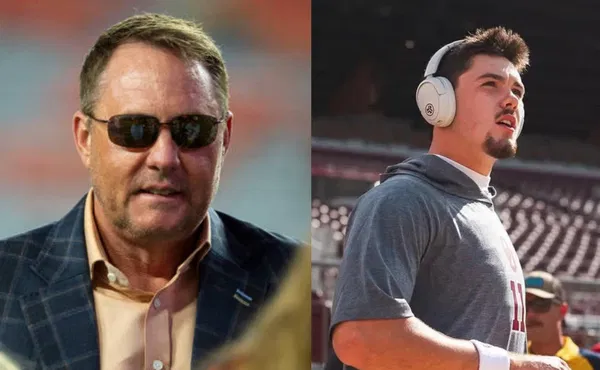
Vanderbilt emerged as one of the most surprising underdogs last season, taking down major college football programs—including a significant win over Alabama. So, when they faced Auburn, many anticipated another upset, and that’s exactly what happened. Vanderbilt defeated Auburn 17-7, handing them their sixth loss of the season. In the aftermath, Auburn’s head coach, Hugh Freeze, began re-evaluating his quarterback options. Although Payton Thorne hadn’t necessarily underperformed, Freeze expressed the need to consider broader changes. However, the quarterback switch didn’t occur, and it appeared Freeze was left questioning everything.
Following that tough season, Freeze brought in Jackson Arnold—a highly touted five-star quarterback from Oklahoma who had previously amassed 1,421 passing yards and 444 rushing yards in the SEC. Despite Arnold’s impressive resume, Freeze wasn’t fully convinced and continued to explore his options. He turned to the transfer portal to recruit Ashton Daniels from Stanford, who had recorded over 2,300 passing yards in his prior season.
Still unsatisfied, Freeze engaged in a tough recruiting battle with Notre Dame and successfully landed Deuce Knight, a five-star dual-threat quarterback known for producing nearly 7,500 total yards in high school. This acquisition wasn’t just another player addition—it was a statement move intended to prevent the struggles of the past from repeating. With Arnold, Daniels, and Knight, Auburn’s quarterback room became one of the most talented in the SEC. However, the real question remained: who would be named the starting quarterback?
As spring practice progressed, Freeze eventually named Jackson Arnold as the starting quarterback. But he made it clear that Arnold would still be challenged daily by both Daniels and Knight. He emphasized that while he wanted Arnold to develop confidence and leadership, he also wanted him to feel the pressure of competition from the talented quarterbacks behind him.
Arnold appears to be a good fit for the starting role. With his dual-threat abilities, he offers more dynamic playmaking than Payton Thorne did last year. He also started seven games in the SEC previously and demonstrated an ability to make plays both through the air and on the ground—qualities that align with Freeze’s offensive approach. However, the ongoing competition means Arnold must remain at peak performance to keep his QB1 status.
Looking at the bigger picture, Freeze’s tenure at Auburn has not yet yielded the results the program hoped for. After a 6-7 season in 2023, Auburn slipped further in 2024, finishing 5-7 with only two SEC wins. Despite the lack of success on the field, Freeze has managed to maintain strong recruiting classes. Auburn’s 2024 class was ranked 8th nationally, featuring standout talents like Cam Coleman and Perry Thompson. The 2025 class is similarly ranked and headlined by Deuce Knight.
As Freeze sets his sights on the 2026 class, Auburn currently holds the 13th-ranked recruiting group, which includes Hezekiah Harris, a top-15 edge rusher. But there’s more to come. Auburn is now pursuing five-star running back Derrek Cooper—ranked third at his position nationally. Assistant coach Derrick Nix even paid a personal visit to Cooper, showing how serious the Tigers are about adding him to their roster. Since the 2026 class lacks a running back so far, securing Cooper would be a major win for the program.
Still, no matter how strong the recruiting looks, Freeze will need to translate these gains into wins on the field. If Auburn’s performance doesn’t improve, even elite recruiting classes may not be enough to secure his long-term future with the team.